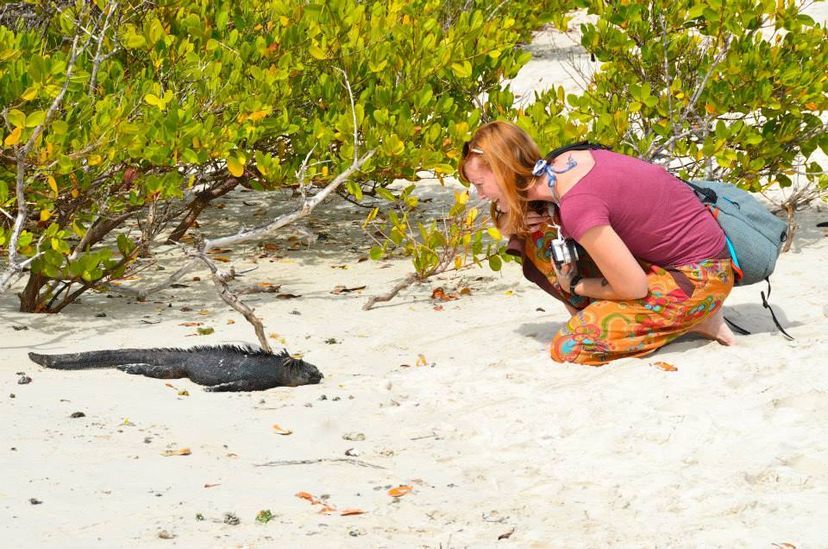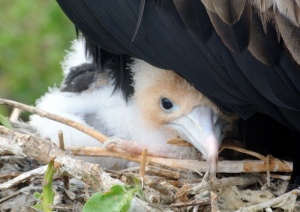
The chain of islands in the Pacific Ocean off the coast of Ecuador is famous for its inspiration of Charles Darwin’s theory of evolution and natural selection. Here on the Galapagos Islands, animals have evolved and adapted to survive in ways found nowhere else on earth.
 Last week, I had the incredible opportunity to go on a 7-day Galapagos wildlife cruise with Ecoventura, one of the most eco-friendly and sustainable tourism companies in the Ecuadorian archipelago. We set off from San Cristobal, on a path that crossed the equator six times and visited 7 islands during the week. Hiking, snorkeling and kayaking were all part of the activities to view the islands and their unique ecosystems and wildlife.
Last week, I had the incredible opportunity to go on a 7-day Galapagos wildlife cruise with Ecoventura, one of the most eco-friendly and sustainable tourism companies in the Ecuadorian archipelago. We set off from San Cristobal, on a path that crossed the equator six times and visited 7 islands during the week. Hiking, snorkeling and kayaking were all part of the activities to view the islands and their unique ecosystems and wildlife.
 One of the most unusual aspects of Galapagos wildlife is how unafraid they are, how completely unperturbed they are by people. Because they are protected and mostly have no natural predators, they really fear little and see no threat from humans in modern times. They do not flee — there is no searching and waiting to spot wildlife. It is right there in front of you, and you can walk right up to them. Our Ecoventura guides, both named Pepe, were clear about the rules not to touch or interact with the animals. But you literally can walk right up to them — iguanas, birds in their nests with babies, sea lions who will swim right up to the boat and want to play.
One of the most unusual aspects of Galapagos wildlife is how unafraid they are, how completely unperturbed they are by people. Because they are protected and mostly have no natural predators, they really fear little and see no threat from humans in modern times. They do not flee — there is no searching and waiting to spot wildlife. It is right there in front of you, and you can walk right up to them. Our Ecoventura guides, both named Pepe, were clear about the rules not to touch or interact with the animals. But you literally can walk right up to them — iguanas, birds in their nests with babies, sea lions who will swim right up to the boat and want to play.
Some of the unique wildlife that we encountered included:
- Giant land tortoises, which can live for 150-180 years or more. At an adult size they typically weigh 300-500 pounds — but in some island highlands, they can get as large as 700 pounds! Along with the iguanas, these are truly modern-day dinosaurs.
 Iguanas, of several species. The land iguanas are more orange in color, while marine iguanas are dark and blend in with the lava rocks. This is the only place on earth with marine, or swimming, iguanas. Yes, these iguanas have adapted to swim, and will even submerge underwater for periods of time to eat algae. I know this because I personally witnessed it while snorkeling!
Iguanas, of several species. The land iguanas are more orange in color, while marine iguanas are dark and blend in with the lava rocks. This is the only place on earth with marine, or swimming, iguanas. Yes, these iguanas have adapted to swim, and will even submerge underwater for periods of time to eat algae. I know this because I personally witnessed it while snorkeling!- Flightless cormorants. These birds are found in many places of the world, but the Galapagos Islands are the only places where they do not fly. Because fish in the water is plentiful for food, and they have no predators, over time the Galapagos cormorants lost their ability to fly. Instead, they adapted into incredible swimmers.
- Red and Blue Footed Boobies. These striking birds were called “bobos” by the Spanish because they thought they were stupid birds — too foolish to evade humans and flee. In fact, they are quite clever and will dive into the water like a rocket, at incredible speed and depths to fish for food.
 We also saw many other animals including dolphins, whales, crabs, hawks, sharks, sting rays, penguins, sea turtles, finches, pelicans and my personal favorite, the sea lions. These animals are intensely curious, especially the young ones who would swim right up to our dingy or our walking on the rocks around us, wanting to play.
We also saw many other animals including dolphins, whales, crabs, hawks, sharks, sting rays, penguins, sea turtles, finches, pelicans and my personal favorite, the sea lions. These animals are intensely curious, especially the young ones who would swim right up to our dingy or our walking on the rocks around us, wanting to play.
One thing I really liked about the Ecoventura line, besides the wonderful guides and staff, was their dedication to making the least footprint possible on this ecosystem. The boat we were on, The Eric, had solar panels and wind turbines to supplement the power. Ecoventura was was the first company to earn and maintain the ecological certification, SmartVoyager, and the first Galapagos cruise ship company to offset carbon emissions and to install alternative energy sources.
Here are a few videos that you might find interesting:
Sea Lions at play
Pacific Dolphins – Hundreds swimming and jumping
Wild Iguana Love
Swimming with Sea Turtles
Advertisement